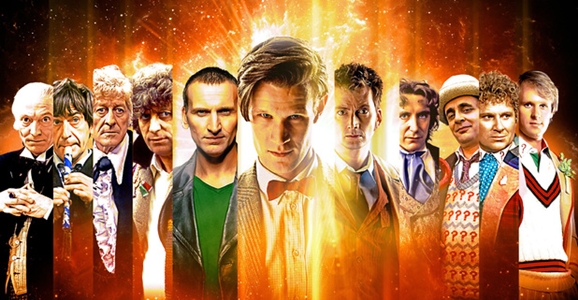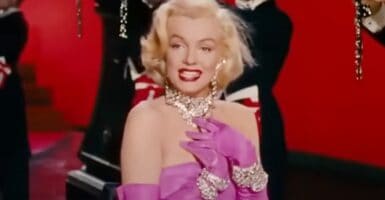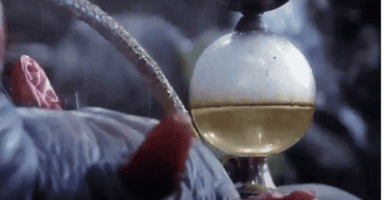Did Steven Moffat Really Just Confirm The Doctor Can Only Regenerate Twelve Times?
This article is more than 2 years old
 It’s a bit of Doctor Who canon that long-time fans have been pointing out more and more lately, as we head toward the introduction of Peter Capaldi as the Twelfth Doctor. The whole reason we’ve had more than one Doctor in the first place is because of the Time Lord’s handy ability to regenerate into a new body whenever he’s mortally wounded. Sure, sometimes he doesn’t want to go (*sob*), but it means he can keep on exploring time and space indefinitely. Except not really. The show established long ago — specifically in the Tom Baker serial The Deadly Assassin — that a Time Lord can only regenerate a total of twelve times. Who executive producer Steven Moffat seems to have just confirmed that tenet of Who mythology…so what does that mean for the show.
It’s a bit of Doctor Who canon that long-time fans have been pointing out more and more lately, as we head toward the introduction of Peter Capaldi as the Twelfth Doctor. The whole reason we’ve had more than one Doctor in the first place is because of the Time Lord’s handy ability to regenerate into a new body whenever he’s mortally wounded. Sure, sometimes he doesn’t want to go (*sob*), but it means he can keep on exploring time and space indefinitely. Except not really. The show established long ago — specifically in the Tom Baker serial The Deadly Assassin — that a Time Lord can only regenerate a total of twelve times. Who executive producer Steven Moffat seems to have just confirmed that tenet of Who mythology…so what does that mean for the show.
Moffat’s surprising confirmation came during a live chat show called Ad Lib Live, unfolding during the Edinburgh Festival Fringe, an enormous annual art festival held in, you guessed it, Edinburgh, Scotland. During the conversation, host Frank Skinner asked Moffat, “Do you acknowledge the convention that The Doctor can only regenerate twelve times?” Moffat replied, “Yes.” Here’s a twitpic straight from Ad Lib’s account:

WARNING: SPOILERS AND SPECULATION FOR DOCTOR WHO’S 50TH ANNIVERSARY EPISODE BELOW!
The subject of the regeneration limit has been on Who fans’ minds a lot lately, for two very good reasons. First, Capaldi is playing the twelfth incarnation of the Doctor, which means the Doctor has so far regenerated eleven times. However, the recent season finale revealed what early rumors had suggested: that John Hurt was appearing in the 50th anniversary episode as a previously unknown incarnation of the Doctor. All signs point to him occupying the slot between Paul McGann’s Eighth Doctor and Christopher Eccleston’s Ninth, and that he is the Doctor who fought in the oft-referenced Time War between the Time Lords and the Daleks.
Except…if that’s true, that means Hurt’s character was the real Ninth Doctor, which means Eccleston was really the Tenth, David Tennant the Eleventh, and Matt Smith the Twelfth. So, assuming that’s true and Moffat doesn’t have some sneaky plan to avoid the problem, that makes Capaldi number Thirteen…if the canon holds true, the final incarnation of the Doctor. So, given how successful and popular Doctor Who is these days, should we presume that the BBC has a subterranean vault full of Capaldi clones they can keep wheeling out indefinitely, or that perhaps they’re pumping him full of anti-agapic drugs so the show can keep on trucking forever?
Here’s the thing. I can’t help but think the specific wording of Skinner’s question needs to be taken into consideration. He asks Moffat if he acknowledges the twelve-regeneration rule. Acknowledges, not agrees with. I acknowledge that the tenets of Scientology exist, but that doesn’t mean I’m going to go get myself audited anytime soon. Moffat’s certainly the sort who would likely take advantage of that bit of linguistic specificity, so his “yes” may be entirely true…from a certain point of view.
On the other hand, he may very well be sticking with the twelve-and-done rule…at least until he reveals some twist or bit of cleverness that will honor the regeneration limit, only to somersault over it and carry on about his business. It’s hardly been a immutable, unchanging rule over the decades. Former showrunner Russell T Davies had the Doctor joke that he could regenerate “507” times in an episode of The Sarah Jane Adventures. The Master alone has tied the concept of regeneration into knots, and the Doctor is nothing if not resourceful. And does anybody out there really think the BBC is going to let their cash cow grind to a halt just because of a forty-year-old bit of Who trivia?
After all, if anybody can figure out a way around an immutable rule of Time Lord biology, it’s bound to be a bloke called the Doctor, isn’t it?












